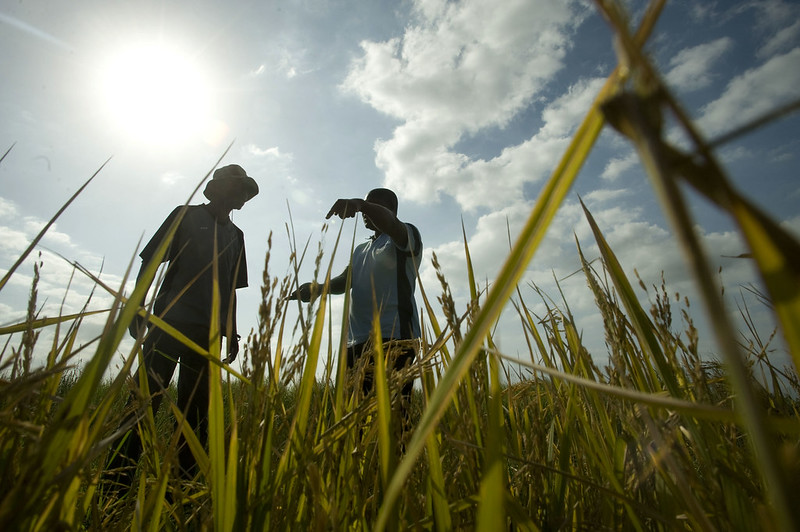Agriculture and Poverty in Mozambique
 Mozambique is currently one of the poorest countries in the world, ranking 181 out of 189 on the Human Development Index. Like many African countries, Mozambique’s political unrest and internal conflict stopped it from reaching long-term economic stability, contributing to the pervasive challenges of poverty. Additionally, repeated cyclones in the region destroyed infrastructure and efforts to rebuild. However, due to its coastal location, rich natural resources and biological and cultural diversity, Mozambique has had an important role in the maritime economy of the Indian Ocean. It has made progress economically since its independence, “with an annual GDP growth rate above 7% in the last five years.”
Mozambique is currently one of the poorest countries in the world, ranking 181 out of 189 on the Human Development Index. Like many African countries, Mozambique’s political unrest and internal conflict stopped it from reaching long-term economic stability, contributing to the pervasive challenges of poverty. Additionally, repeated cyclones in the region destroyed infrastructure and efforts to rebuild. However, due to its coastal location, rich natural resources and biological and cultural diversity, Mozambique has had an important role in the maritime economy of the Indian Ocean. It has made progress economically since its independence, “with an annual GDP growth rate above 7% in the last five years.”
Political Context of Mozambique
A former Portuguese colony to whom it provided many agricultural products, Mozambique gained its independence in 1975 but quickly plunged into civil war afterward. The new government, under President Samora Machel, established a one-state party based on Marxist principles, receiving some military and diplomatic support from Cuba and the Soviet Union. Internal conflicts tore Mozambique as it “battled anticommunist forces funded by South Africa and the former Rhodesia, now Zimbabwe, for control of the country,” according to Britannica. This resulted in the displacement and death of many, and in turn, hindered economic development and discouraged foreign aid. “Despite having one of the fastest-growing economies in sub-Saharan Africa from 2000 to 2015, job creation, poverty reduction and human capital accumulation are still issues in the country,” according to the World Bank.
Poverty, Natural Disasters and Disabilities Mozambique
Of the 27 million people living in Mozambique, 60% live in poverty and more than 70% live in rural areas where access to basic resources is scarce, according to the International Fund for Agricultural Development (IFAD). Farmers and fishers generally make enough to sustain their households, but incomes are limited. The agricultural sector represents 85% of people’s incomes and there is little opportunity outside of it, with the remaining 15% working in industry and services. Poverty is highly concentrated in these rural areas, creating a large divide between the rich and poor.
Natural disasters such as droughts, floods and cyclones have affected the country, especially in recent years. In 2019, tropical cyclone Idai caused catastrophic damage and created a humanitarian crisis in Mozambique, Malawi and Zimbabwe. The cyclone killed more than 1,000 people and destroyed around 100,000 homes. Since then, tropical cyclone Eloise and tropical storm Chalane have hit the same areas causing further damage to rebuilding progress since 2019.
According to a 2017 census, 2.6% of the population in Mozambique lives with a disability. According to UNICEF, 14% of children between the ages of 2 and 9 live with a disability and often experience discrimination at school and their everyday lives, such as their own families hiding them.
Solutions to Poverty in Mozambique
The agricultural sector remains the key to moving people out of poverty. International Food Policy Research Institute (IFPRI) study found that “a 1% growth in the agriculture GDP results in a 2.6% reduction in poverty, compared to 1% overall GDP growth resulting in only 0.25% reduction in poverty.”
While farming is the main source of income for the majority of those living in Mozambique, there is low productivity due to farmers still relying on traditional farming techniques, according to IFAD.
In Mozambique, IFAD “to integrate small-scale producers into profitable and accessible markets,” according to its website. Its result-based strategic networks focus on “improving access of smallholder farmers and artisanal fishers to technologies and services that increase productivity; increasing participation in markets for an equitable share of profits; and increasing access to sustainable financial services in rural areas.”
Similarly, USAID’s Feed the Future Mozambique Promoting Innovative and Resilient Agriculture Market Systems activity focuses on increasing agricultural-based income and market competitiveness to promote economic growth along the Nacala corridor of Northern Mozambique, according to its website.
Action on Poverty trained more than 600 farmers, 60% of whom are women, on how to grow sweet potatoes to increase nutrition. Additionally, it connects smaller farmers with local markets to earn more income, according to its website.
Looking Ahead
Mozambique’s rich resources and economic structure are inextricably linked. The 2023 IGM Annual Conference hosted in Maputo, Mozambique, brings hope to the future of inclusive growth and development and bridging the gap between the needy and the fortunate. Innovations in agriculture and market accessibility are key to promoting economic growth and stability, in turn lowering poverty.
– Elisenne Stoller
Photo: Flickr
